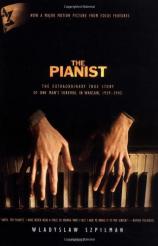Reading Group Guide
Discussion Questions
The Pianist: The Extraordinary True Story of One Man's Survival in Warsaw, 1939-1945

1. What do we learn about the narrator of The Pianist in the book's opening chapter? Who is he? Where does he live? What does he do for a living? Who are his loved ones? Also, discuss the narrator's tone or attitude, given his use of phrases like "the most wonderful of all gas chambers" and other such remarks.
2. "Two lives began to go on side by side," Szpilman writes near the conclusion of Chapter 4, discussing what it was like to be in Warsaw just after the Germans took the city. What were these two lives? What exactly did each life involve? And who were the people leading them? Comment on the dual character that Szpilman ascribes to his hometown, both in this chapter and throughout The Pianist.
3. "I laid my head on the piano and--for the first time in this war--I burst into tears." What specific event causes Szpilman to react in this way? Why does it affect him so? Explain.
4. Much of this memoir finds Szpilman pent-up, stuck in a cage, or held in some other sort of cell: an empty flat, a forgotten attic, etc. In Chapter 6, for example, he writes: "The reality of the ghetto was all the worse just because it had the appearance of freedom. You could walk out into the street and maintain the illusion of being in a perfectly normal city." What did reading The Pianist show or tell you about the psychology of confinement--about the mental, physical, spiritual, and emotional costs of imprisonment?
5. Chapter 8 of the book is entitled "An Anthill Under Threat." Explicate and explain this metaphor. Who or what is Szpilman describing with this image?
6. Look again at the brief conversation Szpilman's father has at the Umschlagplatz with a local dentist and a businessman. What crucial question do they discuss here--and how does each of them view this question? And who did you, as a reader, agree with on this score? Defend your own viewpoint with references from the book itself or with other historical and/or textural references.
7. Around Christmas of 1945, after months of more or less solitary confinement, after years of staying completely hidden, Szpilman briefly imagines himself as Robinson Crusoe. How does he specifically compare and contrast himself with Defoe's archetypal loner? What other literary figures, if any, would you cite as reflections of Wladyslaw Szpilman?
8. Discuss in some detail the role of music in The Pianist. How might music itself be understood as a character in this story? What does music do in this memoir? How does influence or otherwise alter the course of Szpilman's book--and, indeed, the course of his life?
9. Interestingly, The Pianist gives us two back-to-back impressions of the German Captain Wilm Hosenfeld. The first, of course, appears within Szpilman's narrative, where Hosenfeld (although we do not know his name at the time) effectively saves our hero's life. The second impression comes in the form of Hosenfeld's diaries. Draw on both impressions to create a full description (or at least a fleshed-out, 3-D summation) of this person. Discuss whatever links or connections you can establish between Hosenfeld's journal entries and his actions toward Szpilman.
10. In his Epilogue, Wolf Biermann points out that The Pianist "was first published in Poland in 1946 under the title of one of its chapters, Death of a City." Which title, in your view, is the more fitting or appropriate one? Explain.
11. Finally, compare and contrast the memoir version of The Pianist with the film version. In what ways did these two works strike you as similar? In what ways did they affect you differently? (Or, if you have not seen Polanski's film, compare and contrast Szpilman's memoir with other books, plays, or films that you have read or seen concerning the Holocaust.)
The Pianist: The Extraordinary True Story of One Man's Survival in Warsaw, 1939-1945
- Publication Date: December 20, 2002
- Paperback: 224 pages
- Publisher: Picador
- ISBN-10: 0312311354
- ISBN-13: 9780312311353






